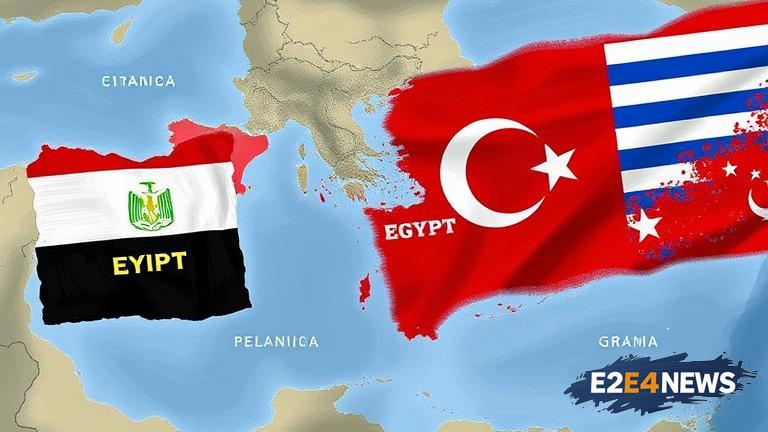The maritime dispute between Egypt, Greece, and Turkey has escalated, with Egypt and Greece rejecting Turkey’s claim to a vast area of the Eastern Mediterranean. The claim, which was made in conjunction with the Libyan government, seeks to establish a maritime boundary that would give Turkey control over a significant portion of the region’s energy resources. However, Egypt and Greece argue that this claim is in violation of international law, specifically the United Nations Convention on the Law of the Sea (UNCLOS). The two countries have long been concerned about Turkey’s aggressive expansion in the region, and this latest move has only served to heighten tensions. The dispute centers on the delimitation of the Exclusive Economic Zone (EEZ) between the countries, with Turkey claiming a large area that overlaps with the EEZs of both Egypt and Greece. The Egyptian and Greek governments have issued a joint statement condemning Turkey’s actions, stating that they will not recognize the claimed boundary. The statement also emphasized the importance of respecting international law and the sovereignty of all nations in the region. The Turkish government has responded by accusing Egypt and Greece of trying to undermine its rights in the region. The dispute has significant implications for the energy industry, as the Eastern Mediterranean is home to large reserves of natural gas and oil. The region has seen a surge in exploration and production activity in recent years, with several major discoveries made off the coasts of Egypt, Israel, and Cyprus. However, the dispute over the maritime boundary has created uncertainty and instability, making it difficult for companies to invest in the region. The European Union has also weighed in on the dispute, issuing a statement that supports the rights of its member states, including Greece and Cyprus. The EU has also called on Turkey to respect international law and to engage in constructive dialogue with its neighbors. The United States has also expressed concern over the dispute, with the State Department issuing a statement that encourages all parties to resolve their differences through peaceful means. The dispute has also raised concerns about the potential for conflict in the region, with some analysts warning that the situation could escalate into a full-blown crisis. However, others argue that the dispute is primarily a diplomatic one, and that a resolution can be found through negotiations and compromise. The Egyptian and Greek governments have stated that they are willing to engage in talks with Turkey, but only if it agrees to respect international law and the sovereignty of all nations in the region. The Turkish government has also expressed a willingness to negotiate, but it has refused to back down on its claim. The dispute is likely to continue for some time, with significant implications for the region and the global energy industry. In the meantime, the international community will be watching closely, hoping that a resolution can be found that respects the rights of all parties involved. The situation is complex and multifaceted, with a range of historical, political, and economic factors at play. The dispute has also highlighted the importance of international law and the need for countries to respect the sovereignty of their neighbors. As the situation continues to unfold, it is likely that we will see further developments and statements from all parties involved. The international community will be hoping that a peaceful resolution can be found, one that respects the rights of all nations in the region and allows for the peaceful exploration and production of the region’s energy resources.
